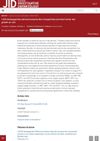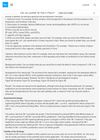 9 citations,
March 2019 in “Scientific reports”
9 citations,
March 2019 in “Scientific reports” Temporary ROS production in cultured human hair follicles promotes growth and stem cell activation.
 8 citations,
March 2020 in “Frontiers in Cell and Developmental Biology”
8 citations,
March 2020 in “Frontiers in Cell and Developmental Biology” Researchers created immortal human skin cells with constant testosterone receptor activity to study hair loss and test treatments.
 4 citations,
February 2022 in “International Journal of Cosmetic Science”
4 citations,
February 2022 in “International Journal of Cosmetic Science” Watercress extract helps increase hair growth and thickness by blocking hair loss factors.
 October 2024 in “International Journal of Molecular Sciences”
October 2024 in “International Journal of Molecular Sciences” Rosa rugosa extract promotes hair growth and could be a natural treatment for hair loss.
August 2024 in “Food Bioscience” Bifidobacterium longum BB536 metabolites may help treat hair loss by repairing and promoting hair cell growth.
 February 2024 in “Journal of Dermatological Science”
February 2024 in “Journal of Dermatological Science” Curved hair can develop when hair cells merge abnormally during growth.
 January 2024 in “Archives of Biological Sciences (Beograd)”
January 2024 in “Archives of Biological Sciences (Beograd)” AP collagen peptides may help hair grow better and become stronger.
September 2023 in “World Rabbit Science” The FRZB gene slows hair growth in rabbits.
 June 2023 in “Italian Journal of Medicine”
June 2023 in “Italian Journal of Medicine” Urotensin II increases growth and VEGF production in rat skin cells by turning on the Wnt-β-catenin pathway.

Ashwagandha-derived nanoparticles can promote human hair growth.

Cinchona succirubra extract with caffeine reduces hair loss and strengthens hair.
 April 2023 in “Journal of Investigative Dermatology”
April 2023 in “Journal of Investigative Dermatology” Cinchona succirubra extract with caffeine improves hair growth and reduces hair loss.
 April 2023 in “Journal of Investigative Dermatology”
April 2023 in “Journal of Investigative Dermatology” Ashwagandha nanoparticles help increase hair growth.
 April 2023 in “The journal of investigative dermatology/Journal of investigative dermatology”
April 2023 in “The journal of investigative dermatology/Journal of investigative dermatology” JAK inhibitors help hair growth by boosting beta-catenin activity in hair root cells.
 November 2022 in “Journal of Investigative Dermatology”
November 2022 in “Journal of Investigative Dermatology” The extract of Silybum marianum, Manganese PCA, and Lespedeza capitata can boost hair growth and extend the growth phase when combined in a serum.
 August 2021 in “Journal of Investigative Dermatology”
August 2021 in “Journal of Investigative Dermatology” Stress causes hair loss by making the body produce cortisol, which stops hair cells from growing.
 September 2019 in “Journal of Investigative Dermatology”
September 2019 in “Journal of Investigative Dermatology” Dermal Papilla Cells grown in 3D and with stem cells better mimic natural hair growth conditions than cells grown in 2D.

VB-1, a natural compound, may promote hair growth by enhancing important cell signaling and increasing key gene expression.
 April 2018 in “Journal of Investigative Dermatology”
April 2018 in “Journal of Investigative Dermatology” Culturing Dermal Papilla Cells and Hair Follicle Stem Cells in 3D conditions can significantly improve hair regeneration potential.
 April 2018 in “The journal of investigative dermatology/Journal of investigative dermatology”
April 2018 in “The journal of investigative dermatology/Journal of investigative dermatology” Biotrinine® may be an effective treatment for chronic hair loss.
 August 2015 in “MOJ proteomics & bioinformatics”
August 2015 in “MOJ proteomics & bioinformatics” ePUKs could be valuable for regenerative medicine due to their wound healing abilities.
 May 2009 in “Hair transplant forum international”
May 2009 in “Hair transplant forum international” Androgens affect hair growth and shedding, with genetic and non-genetic factors influencing baldness.
 July 2022 in “The journal of investigative dermatology/Journal of investigative dermatology”
July 2022 in “The journal of investigative dermatology/Journal of investigative dermatology” Silybum marianum extract, Manganese PCA, and Lespedeza capitata extract may help with hair growth and anchorage, potentially aiding in hair loss treatment.
 October 2024 in “Current Issues in Molecular Biology”
October 2024 in “Current Issues in Molecular Biology” Platycladus orientalis leaf extract helps hair grow by activating certain proteins.
November 2022 in “Molecular Pharmaceutics” cp-asiAR may effectively treat androgenetic alopecia by promoting hair growth and reducing androgen receptor activity.
 25 citations,
September 2018 in “Scientific Reports”
25 citations,
September 2018 in “Scientific Reports” Morroniside may help hair grow and stay in its growth phase by affecting certain cell signals.
 47 citations,
October 2016 in “Molecular and Cellular Endocrinology”
47 citations,
October 2016 in “Molecular and Cellular Endocrinology” Androgens prevent hair growth by changing Wnt signals in cells.
 28 citations,
February 2016 in “F1000Research”
28 citations,
February 2016 in “F1000Research” Understanding glycans and enzymes that alter them is key to controlling hair growth.
 16 citations,
October 2018 in “Experimental Dermatology”
16 citations,
October 2018 in “Experimental Dermatology” Mesenchymal stem cell therapy may help treat alopecia areata by promoting hair growth and reducing inflammation.
 15 citations,
May 2020 in “BMC complementary medicine and therapies”
15 citations,
May 2020 in “BMC complementary medicine and therapies” Polygonum multiflorum extract helps hair grow longer and fights the effects of hormones that cause hair loss.


























